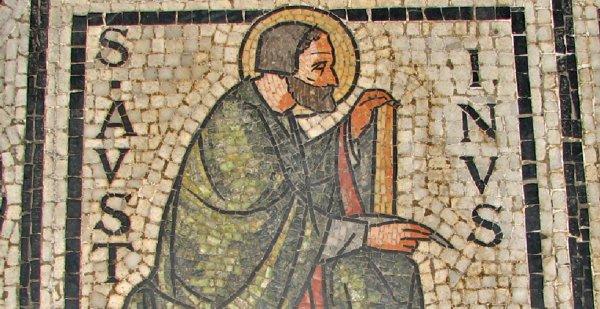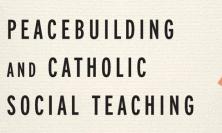On the feast of St Augustine, Anthony Meredith SJ explores the life and works of the man who left a great legacy to the Church in the form of his seminal writings and the theological vision he expressed in them.
The extraordinary man whose feast we keep on August 28, died on that day in 430 in the city of Hippo, as the Vandals were besieging the city of which he had been bishop for nearly 35 years. Augustine’s biographer, Possidius, tells us that as he died he consoled himself, not as we might expect with some words from his favourite New Testament writer, Saint Paul, but instead with a sentence from a third century Greek philosopher, Plotinus: ‘One that sets great store by wood or stones, or…. by mortality among mortals cannot yet be the Sage, whose estimate of death must be that it is better than life in the body’ [Ennead 1:4:7].
Augustine’s faith was essentially a thinking faith, endeavouring to bring together the belief of his heart and the abilities of his mind. This is well illustrated by the fact that his favourite verse from scripture was a [mis]quotation from Isaiah 7:9, ‘If you do not believe, then you will not understand.’ Faith seeks understanding: faith first, understanding afterwards. This is the leitmotif of his 15-book work, On the Trinity, and is especially prominent towards the end of book 7.
We are better informed about Augustine than about any other figure in the ancient world, and this is above all because he did something which no other ancient writer, with the possible exception of the great orator and letter writer Cicero, ever did: he wrote an autobiography. The Greeks abhorred autobiography; however, Augustine’s Confessions, composed between 397 and 400, began a trend that surfaced above all in Rousseau and later in John Henry Newman with his Apologia pro vita sua.
‘Confessions’
In Confessions, which is a wonderful mixture of self-exploration and praise of God - the word confession, as the present pope indicated years ago, is a fusion of both ideas – we are brought face to face with the author. We learn of his indifferent father, Patrick; of his very strong-minded mother, Monica; of his brother, Navigius; of his youthful lusts and misbehaviour; of his unnamed mistress and the son she bore him; of his superb education in rhetoric; of his mental problems; of his five year residence (383-388) in Italy; of his intellectual conversion with the help of Plotinus and of his moral conversion with the help of Saint Paul; and of his baptism by Saint Ambrose on Easter Day 387.
What must strike the reader about this amazing work is its linguistic, rhetorical force. Through the memorable character of his prose, Augustine was able to powerfully express his theological vision. Towards the very beginning of book 1 of Confessions, Augustine writes: ’Thou hast made us, O Lord, for thyself and our heart is restless till it rest in thee’. In book 8, he asks of God: ‘Give me chastity, but not yet.’ A prayer repeated three times in book 10 is particularly notable: ‘Give what you command and command what you will.’ This particular line caused great upset to the British writer, Pelagius and began a debate which would continue for decades. Pelagius thought it quite possible to be morally upright without being religious - a view which Augustine did not share.
During the course of his episcopacy Augustine delivered a very large number of sermons – 500 at a conservative estimate – which were taken down by shorthand writers or note-takers across his diocese. Like his writings, his sermons fuse together his powers of rhetoric and his theological vision. A particularly striking vision is delivered in sermon 341, which deals with the three modes of the presence of the Word of God: he is present with the Father from all eternity, he is present in Christ to whose human nature he was united at the Incarnation, but he is also present in his body, which is the church, at the same time his bride.
If we add to the above more than 150 sermons on the psalms, 124 homilies on the fourth gospel and his 250 or so letters, presumably either dictated or written, we gain a glimpse of Augustine's extraordinary industry and versatility. Consider also his pastoral care for the faithful of his diocese - in another sermon [340], Augustine tells his hearers that he is responsible for them as their bishop, but at the same time is a Christian with them - and we gain some insight into the energy and minute care which characterise this remarkable man.
But our amazement is increased when we recall the other literary works Augustine produced, as distinct from the administrative activities he fulfilled. To the 35 years of his episcopacy belong; 1] his controversy with Pelagius and his successors on the vital subject of grace and freedom, to which is allied his advocacy of the doctrine of original sin; 2] his 15-volume work On the Trinity, written over a period of some 15 years; 3] his debate with the Donatists until their official condemnation by the state in 411, regarding the holiness of the clergy and other members of the Church, and 4] last, but not least, his masterly City of God, written over a period of some 13 years, a work which endeavours to account for the sack of Rome by the Goths in the summer of 410 and to answer the charge made by the pagans that the fall of the city was the result of its abandonment of its traditional religion and gods.
In all of these areas, Augustine made a contribution to developing a thinking faith, a legacy which is still with us today. In fact it is sometimes claimed that the major theological differences which separate East and West derive from his influence. Two points in particular are singled out: Augustine’s teaching on the divine unity: and his teaching on original sin. He always challenges us, even if we may not feel completely comfortable with the solutions he proposes. He is easy to portray as an either/or man, whereas he is in fact a both/and one. It is not a question of contemplation or action in this life, but both; not faith or works, but faith and works; or again, not faith or reason, but faith and reason, with the important proviso that we must make sure that first things come first.
But behind our analysis of all his varied positions, there lies a challenging and fascinating question: underneath or beyond Augustine’s concern with the unity of God, the primacy of grace over nature and of religion over morality, the nature of the City of God and of the city of this world, and the importance of the sacraments as distinct from the morality of the clergy, it is possible to isolate a vision of God which holds all these insights together?
Augustine’s Theology
At the centre of Augustine’s attempts to understand the divine nature is the central thought that God is beyond the range of the human mind. In a famous sermon [52], he writes ’If you think you have grasped him, it is not God you have grasped’ - si comprehendis non est Deus. Yet, while always recognising the inevitable mystery of God. Augustine does not let the limitations of the human mind deter him from his pursuit of a greater understanding of God, and there are many examples of this.
In his wrestling with the problem of evil, Augustine does not simply say. ‘It is a mystery’ and leave it at that. In book 7 of the Confessions he relies on the arguments of Plotinus to prove that evil is somehow unreal. In his discussion of divine justice as described in Romans 9, where he wrestles with the intractable problem of divine election, Augustine refuses to measure divine justice by human standards, yet he still asserts that God is just. Unlike other early Christian writers Augustine does not try to fit God into a moral mould derived from human experience. The divine goodness, mercy and power are not to be equated with our own. So, in answer to the question of why some are chosen to have faith and salvation and others are not, Augustine’s answer is effectively that God’s ways are not our ways; he warns against try to imprison God in manmade categories.
Revelation presents us with a God who is both one and three, one God in three persons: Father, Son and Holy Spirit. But three into one will not go. Now Augustine could have said simply, ‘This is a mystery; just accept it and don’t try to understand and master it ‘, but the whole drift of his 15 volume work on the Trinity is a serious attempt to come to terms with this mystery. He argues that as we are made, according to Genesis 1:26, ‘after the image and likeness of God’, we should be able to discover by introspection certain reflections of the divine nature. In book 10 of the work he argues that as we are one, yet also have a threefold character in us – memory, understanding and will – so too there are three persons in God, all equal, but not the same. Another example of Augustine’s thirst for understanding, but acceptance of the mystery that is the object of his faith.
One of the most challenging and at the same time disturbing elements of Augustine’s approach is the emphasis he places upon the condition of the heart as vitally distinct from external action. The emphasis on the heart is central in the writing of Confessions, where the heart is thought of less as the emotional centre of the human being than as the centre of all conscious activity. His consciousness of the inwardness of true religion, as distinct from its external manifestations, finds expression in book 3 of Confessions with the following words with which he addresses God: ‘You were more inward than my most inward part and higher than the highest element within me.’ This sums up a constant element of the thought of Augustine, echoed again in his treatise On Free Will: ‘Do not go outside.’
This aspect of his thought also betrays two of Augustine’s major influences, as it echoes the Pauline understanding of grace and the Plotinian notion of the presence within all of us of the One. For Saint Paul, grace is the freely given and at the same time necessary power, without which salvation is impossible: ‘By grace we are saved’ [Ephesians 2:5]. A favourite verse of Augustine is from 1 Corinthians 4:7: ‘What have you that you have not received?’ Plotinus also has a not dissimilar view, though applied to the ever-presence of the absolute in each one of us, when he writes, ‘All is within. There is no need to search for it outside of yourself.’ [cf Ennead 1:6:8] The influence of this passage on Augustine is particularly marked by his treatment of Luke’s parable of the Prodigal Son in Confessions 1:18:28.
The Sermon on the Mount stresses the importance of inwardness in religion that Augustine describes. Membership of the church as both the body and bride of Christ, important though that is, does not by itself guarantee our ultimate membership of the City of God. Not only are we forever on pilgrimage to the promised home of heaven, a theme insisted upon by Augustine in the City of God, we need to be reminded that the ultimate criterion of membership is not the external demands of membership - true teaching, a moral life and the reception of the sacraments - but we need also to be controlled by the love of God to the contempt of self, rather than the opposite [City of God 14:28].
In Saint Augustine we meet one of the most fascinating figures in the whole history of the church. Together with Jerome, Ambrose and Gregory the Great, he forms the group known as the Latin Fathers. Yet despite his intellectual distinction it is not always easy to find him coherent, as he deals with the deepest mysteries of his faith. How can God be both eternal and yet both create and become part of time? How can we be totally dependent on grace and yet also free? Augustine points us to these mysteries, beyond himself. May he help us on his feast day to be as serious and humble as he was.
Anthony Meredith SJ teaches Theology at Heythrop College, University of London.






